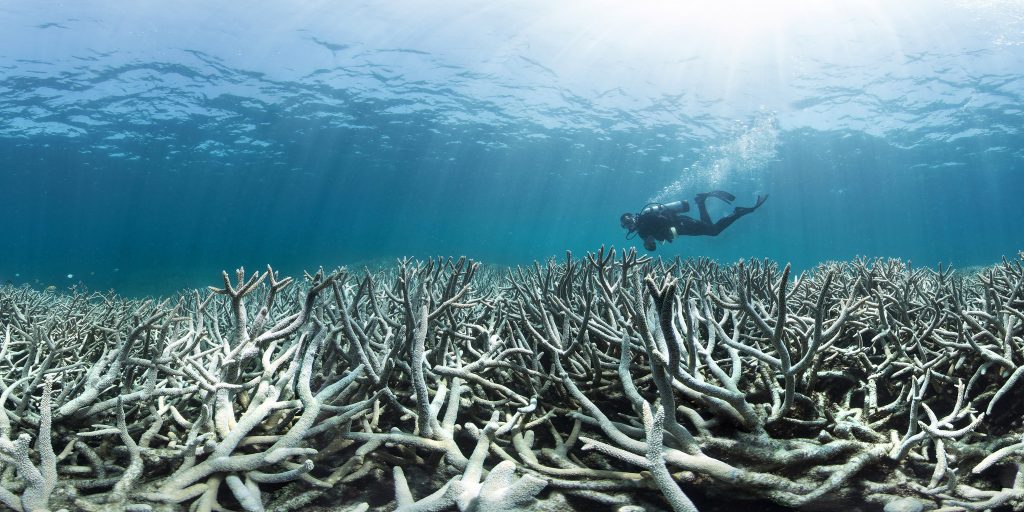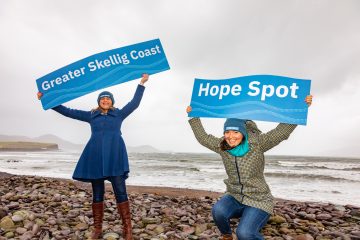Rare sponge reef and coral species found off west coast of Ireland

July 25th, 2018
A team of Irish marine scientists may have discovered a new species of coral in the deep ocean off Ireland’s west coast.
The researchers announced the finding on their return to land following a three-week survey led by the national seabed mapping programme ((INFOMAR) to examine the deep ocean 300 miles off our coast.
Scientific experts on-board to witness the findings were from the Marine Institute, the National Parks and Wildlife Service, the National University of Ireland Galway and Plymouth University.
Using a high definition camera mounted on the Marine Institute’s Holland 1 robot submarine, the team captured a number of firsts in Irish waters, including octocoral – a type of coral that grows into huge fans with a delicate porcelain-like skeleton – and a species of black coral which may prove to be an entirely new species.
The scientists also found areas of potential sponge reef on the Rockall Bank, described by the researchers as a “highly unusual accumulation of living and dead sponges” that forms a complex habitat for other sea creatures.
Cold water coral reefs host a diverse range of marine animals including sponges, starfish, crustaceans and a variety of fish species.
Robot submarine and detailed seabed maps used to find sensitive underwater habitat – rare sponge reef https://t.co/jGeUaKj3e1 @followtheboats #coral #ROVHolland1 #deepsea pic.twitter.com/UWTk5SGUnd
— Marine Institute (@MarineInst) July 23, 2018
Such formations are considered very rare and have previously only been recorded in Canadian waters. Plymouth University’s Dr Kerry Howell, who was part of the research team, said that she has not seen a sponge reef like the one discovered in almost 20 years of studying the deep northeast Atlantic.
“This is an important find. Sponges play a key role in the marine ecosystem providing habitat for other species and recycling nutrients. They may even be a source of new antibiotics. These new data will help us to better understand where and why these reefs occur,” she added.
Chief Scientist on the survey, David O’Sullivan of the Marine Institute, hopes that the finds help us to better understand our seabed and appreciate “Ireland’s invaluable marine environment”.
“These sensitive habitats are very important and this study is key to getting a better understanding of Irelands’ deep sea. Our key objective is to discover, protect and monitor Ireland’s rich offshore marine biodiversity so we can manage our marine resources effectively.”
The survey-is the second of three planned expeditions jointly funded by the Irish Government and the EU’s European Maritime and Fisheries Fund (EMFF).
Under the Habitats Directive, member states must take measures to evaluate the status of offshore habitats and to avoid the deterioration of protected habitats.

Coral bleaching at Heron Island Feb 2016 Photo: The Ocean Agency / XL Catlin Seaview Survey / Richard Vevers
Coral under pressure globally
According to a recent study in the journal Science, the current rapid rate of coral bleaching is undermining the capacity of coral reefs to recover and is threatening their very existence.
Coral bleaching occurs where corals expel crucial algae living symbiotically within their tissues as a stress response to increasing ocean temperatures. When bleaching is severe and prolonged, many of the corals die and it can take several decades for new coral to grow back.
The presence of plastic trash in our oceans is also contributing to disease in coral reefs, with a 2018 study from Cornell University finding that 11 billion plastic items get caught in coral reefs throughout the Asia-Pacific area alone. This figure is expected to jump by 40 per cent by 2025.
The plastic can act as hosts to bacteria and microbes, the study states, making it the perfect vessel for microscopic organisms that can spread diseases once they come in contact with corals.
[x_author title=”About the Author”]







